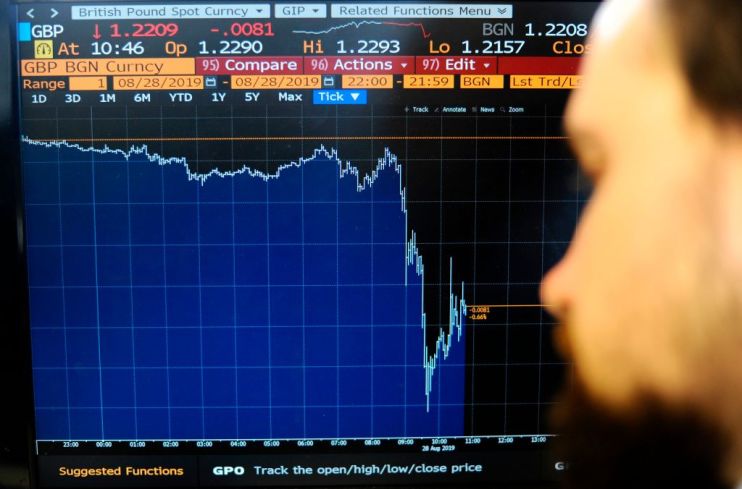Coronavirus: Sterling plunges as investors flock to dollar safe haven

Sterling has plunged to its lowest level against the US dollar (GBP/USD) since October last year on the back of global coronavirus-related uncertainty.
The pound crashed as low as 2.36 per cent against the dollar today to fall to just $1.2517, as traders flocked to the greenback.
By 5.35pm it stood 1.63 per cent down at $1.261.
The sterling sell-off came on another punishing day for UK stocks, with the FTSE 100 index suffering its worst one-day plunge since 1987 to book a 10.9 per cent drop.
US President Donald Trump’s decision to ban all travel from Europe to the US, except from non-Schengen zone countries like the UK and Ireland, spooked traders.
Analysts explained a huge global sell-off of volatile assets in reaction to the ban has driven up the dollar’s value.
Tajinder Dhillon, senior research analyst at Refinitiv,said: “Covid-19 and a collapse in oil prices have caused a plunge in risk assets. The S&P 500 has entered into a bear market, falling over 20 per cent from its February peak. This has led to a flight to safety including bonds, gold, and Japanese Yen.”
And Ranko Berich, head of market analysis at Monex Europe, added: “We are seeing multiple markets across the globe with extremely unusual amounts of volatility.
“The main takeaway right now is markets are convulsing with extreme amounts of fear and risk aversion. Today that has manifested as a massive bid for US dollars.”
“It is cash pouring into the dollar that pushed sterling to current levels. We see the same across all currencies,” added Ipek Ozkardeskaya, senior analyst at Swissquote Bank.
“Investors may be piling into cheap US dollars with cash liberated from European indices sales.”
Trump travel ban sinks sterling and euro
Trump defended the measure today as a move to defend the US from a rise in coronavirus cases. But observers warned of the impact on global trade.
The travel ban prompted traders to send the FTSE 100 into coronavirus freefall as they quit UK stocks in their droves.
“The travel ban is a decisive step to prevent the spread in the US but will cripple trade between the two continents,” London Capital Group’s Jasper Lawler said. “Goods will still flow but presumably at reduced pace and trade in services will almost grind to a halt.”
Investors piled into safe haven assets like US Treasury yields, which traders buy in dollars, pushing up the value of the greenback. The dollar is increasingly seen as a safe haven asset, in part due to its dominant use in global payments.
The euro also fell 0.61 per cent against the dollar to $1.119 after the European Central Bank (ECB) failed to restore market confidence with stimulus measures this afternoon.
But sterling tumbled against the euro too, sinking 1.05 per cent to $1.1268 by 5.35pm.
“The dollar has been left as the last haven standing,” Berich said.
He added the massive sell-off has driven demand for liquidity, which has boosted the greenback.
“We are seeing a lot of reports of a lack of liquidity in the US. There’s companies looking for liquidity and banks are attempting to provide cash to offer that liquidity. That has created a shortage of physical cash so the price of the dollar has gone up,” Berich explained.
Global stocks crash in market rout
Global stocks sank deep into the red today in an almost unprecedented day of market turmoil.
The FTSE 100 crashed 10.1 per cent to just 5,282.4 points and Europe’s Stoxx 600 crashed 11.1 per cent.
Similar sell-offs were seen in the US as the New York Stock Exchange halted trading after the S&P, Dow Jones and Nasdaq all fell by more than seven per cent within minutes of the market opening.
The sharp drop in US stocks triggered circuit breakers, which halt trading on the markets for 15 minutes.
It is the second time this week the automatic system has been activated to curb panic selling.
That did not calm traders, however, with the S&P 500 down 8.8 per cent, Dow down 9.2 per cent and Nasdaq down 8.4 per cent by 4.15pm.
Markets in ‘panic mode’
Bond yields have continued to decline in the US and the UK, indicating people are flocking to less risky investments.
Forex trading platform Equals’s chief economist, Jeremy Thomson-Cook, said global markets are in “panic mode”.
He said: “At the moment, investors are looking to financial institutions and governments to stand up and commit something to fighting this downturn. The ECB has had to call out governments to open their wallet and last night’s address from the White House was met with disbelief as to its lack of a plan beyond flight bans. The time for action is now or we are going to be talking about credit crunches again.
“Sterling is caught in the middle; a currency that has lost its haven status courtesy of Brexit while investors hold dollars as the global reserve currency.”